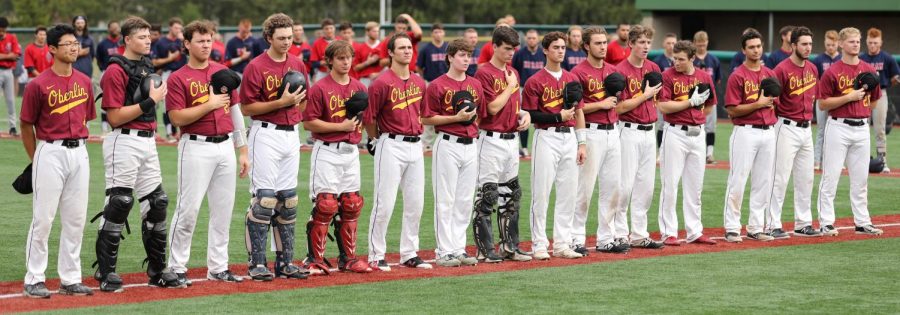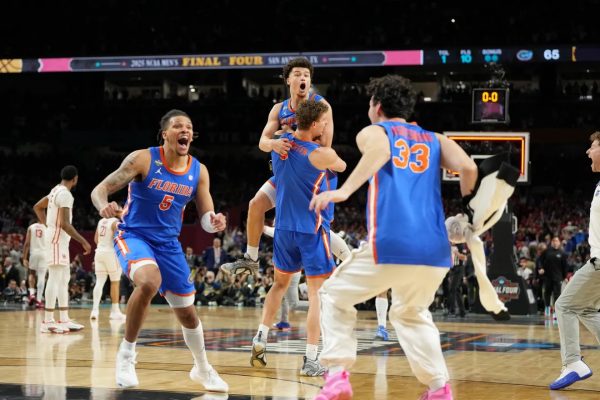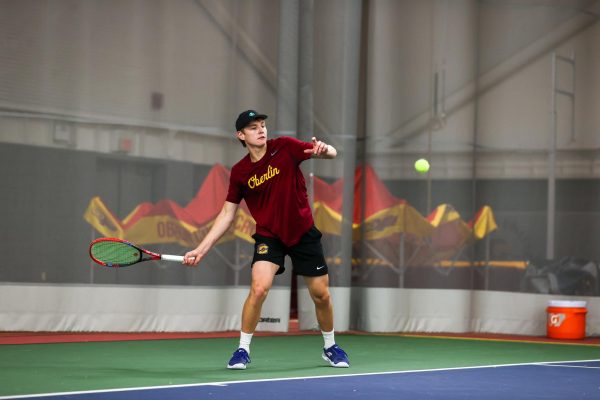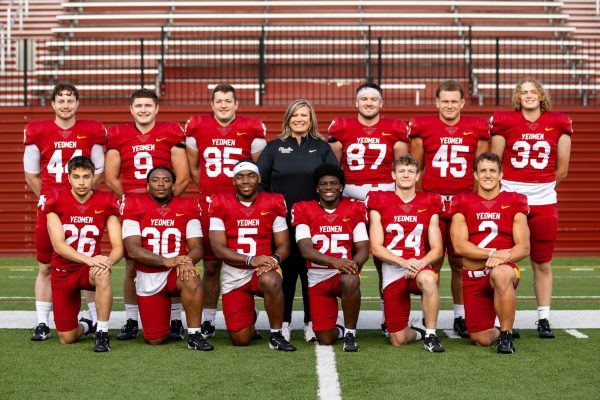Seasons Canceled Amid COVID-19 Outbreak
Photo Courtesy of OC Athletics
The baseball team, one of many sports teams to have their spring seasons canceled.
Novel coronavirus, known as COVID-19, has severely impacted the everyday lives of people around the world. As the virus continues to spread around the U.S., efforts have been made to minimize exposure risks by colleges and universities, including by the College’s Department of Athletics and Physical Education. Throughout the week, the College has released various plans outlining COVID-19’s potential impact on competition and training for spring sports. It was announced late Thursday afternoon that the remainder of Oberlin’s 2020 spring sports season was canceled effective immediately.
National Context
COVID-19’s global impact on collegiate athletics has created a ripple effect around the nation. On Thursday, NCAA President Mark Emmert and the Board of Governors canceled the Division I men’s and women’s 2020 basketball tournaments, as well as all remaining winter and spring NCAA championships.
This cancelation directly impacted the four Oberlin women’s track and field athletes who traveled to North Carolina this week to compete in the NCAA championships, only to find that the competition was canceled the day before.
College fourth-year Naeisha McClain was frustrated with the lack of communication between NCAA officials and student-athletes. While McClain was supposed to compete on Saturday, her teammates were set to compete today. When news of the cancelation broke, athletes from schools around the country were already in North Carolina and ready to compete. This led to emotional responses from many athletes as they realized their last chance of national competition was taken away. McClain was hoping to earn her second All-American, an opportunity she will never have again.
“For the past two years I’ve battled to get back to nationals, taking whatever punches were thrown at me along the way,” McClain said. “ It seems like no one thought of us when they made this decision. Why have us come to North Carolina, have us practice today, only to turn around and cancel it? We deserve better.”
Multiple Division-I conferences, including the American Athletic Conference, Atlantic Coast Conference, Big 10, Big 12, Big East, Pac-12, and Southeastern Conference, have also canceled their conference tournaments.
In addition to derailing collegiate sporting events, COVID-19 has also impacted professional sports events. This past week, the NBA suspended its season after two Utah Jazz players tested positive for COVID-19 in Oklahoma City.
“The NBA is suspending game play following the conclusion of tonight’s schedule of games until further notice,” read the NBA’s statement in response. “The NBA will use this hiatus to determine next steps for moving forward in regard to the coronavirus pandemic.”
General Plan For Athletic Programs
The decision to cancel the rest of the spring season was not made lightly. The day before, athletes expected to remain on campus during spring break with a “no spectators” policy in effect.
However, as the public health crisis progressed, it became apparent that this pandemic would continue to spread and put players and coaches at further risk. In a statement released on GoYeo, the official athletic site of Oberlin College, Delta Lodge Director of Athletics and Physical Education Natalie Winkelfoos highlighted the impact of this decision on not only spring athletes, but also athletic staff.
“Our institution’s competitive advantage will always be the care we provide to our students during challenging times,” she wrote. “With the announcement of our spring sports season coming to an end, our athletics staff is devastated for the loss of time we get to spend with our student-athletes on our playing fields, courts and track — our favorite classrooms on campus.”
All athletes are now expected to leave campus along with the rest of the student body. The change in policy has created challenges for some students who cannot return home or travel to another off-campus location given the limited time frame.
Given these difficulties, some athletes have opened their homes to their teammates. College fourth-year and softball team Captain Alexis Dill was proud of how her teammates have stepped up and continued to support each other at all times.
“One of my teammates can’t go home right now, so they’re going home with another teammate for the time being,” she said. “It goes to show how much of a family we all are; we’re always there for each other. And it’s not just our team. The athletic community, especially spring athletes, have really rallied to support each other during this time.”
Seniors Express Sadness
In light of recent events, the spring athletes preparing to graduate have been faced with challenging news: Not only will they miss the rest of their season, but they will also miss events that they have been looking forward to for the past three years: Senior Night, Commencement, and Senior ’Sco.
College fourth-year and Men’s Lacrosse captain Erik Zeug was expecting adjustments to the season, but he was surprised to learn that he would be playing his last collegiate game this week.
“I think we expected some kind of blowback,” he said. “We’ve expected some adjustments, but I can’t lie to you and say we expected what we’re looking at right now. It’s pretty devastating.”
College fourth-year and Women’s Tennis Captain Delaney Black shared similar sentiments. She had prepared for the possibility of travel cancelations over spring break, but did not realize that her entire season was in jeopardy.
“We talked about having our spring break canceled so we wouldn’t be going anywhere else, but I never expected to need to leave campus,” she said.
Dill was saddened to know that her and her teammates’ hard work would never have the opportunity to be translated to the field.
“It’s devastating news obviously — it’s devastating for everyone, not just to fourth-years,” she said. “We’re not going to get the chance to play with our first-years, who we became close to. The coaches put in all this work all offseason. We worked our butts off all year to create good team chemistry and to create a winning team. And now we don’t get to see the results take place on the field.”
When asked about the fact that this week is possibly the last of their collegiate careers, many fourth-years became emotional.
“I feel like I’ve put in four years of work to not really get the opportunity to see what I can do now,” said Black. “The idea that I won’t get a senior day, and I won’t get to compete with my doubles partner anymore when we’re doing really well in the year, is extremely upsetting.”
Zeug focused on the family aspect of the team as something that he is grateful for and will miss.
“The team is my family,” he said. “You can go to a lot of schools, and you don’t have that. Family. You hear a lot about people fighting in the locker room, or of people just thinking about themselves, but what is so beautiful about this team is that, no matter what virus is going around, I will have brothers forever and friends forever.”
First-Years Lose Collegiate Debut
With fourth-years missing out on their last collegiate season, first-year spring athletes are also at a loss, as they have not had the opportunity to apply their preseason practice and hard work to actual games.
Once both the New England Small College Athletic Conference and the Ivy League canceled their spring seasons, nerves began to set in — especially given that, historically, Oberlin almost always follows in NESCAC’s footsteps.
College first-year and men’s lacrosse player Ben Hicks felt “robbed,” and expressed “wanting so much more from this season.”
With this being said, many athletes are understanding of the situation and are hopeful to know that they have more years ahead in their careers. This includes College first-year and tennis player Dina Nouaime, who has had a successful start to her collegiate career, going 5–3 in singles and 7–6 in doubles, and has been playing as the number 1 seed for the team.
“It feels a bit stressful and disappointing to potentially be losing my first collegiate season, but I feel fortunate to have three more opportunities to come,” she said.
Looking Forward
With most spring sports looking like they would have been eligible to qualify for the North Coast Athletic Conference tournament, many see the end of the 2020 season as disappointing.
While many athletes are leaving their seasons feeling defeated, Zeug highlighted one of the more positive aspects of the recent news, which is that everyone is in it together, and the beauty of all sports is that they are unpredictable.
“I feel for all the other athletes out there in the country — I’m not alone in that,” he said. “It feels like it was just so rushed. I wasn’t ready to have that nostalgia. I sat on the field for a long time in my uniform and let it hit me — that’s the last time I could play on Bailey. It’s horrible. But you know, it being horrible is how it has to end sometimes. That’s why we play sports, right? It’s always uncertain, and for the people playing, that makes it beautiful.”






